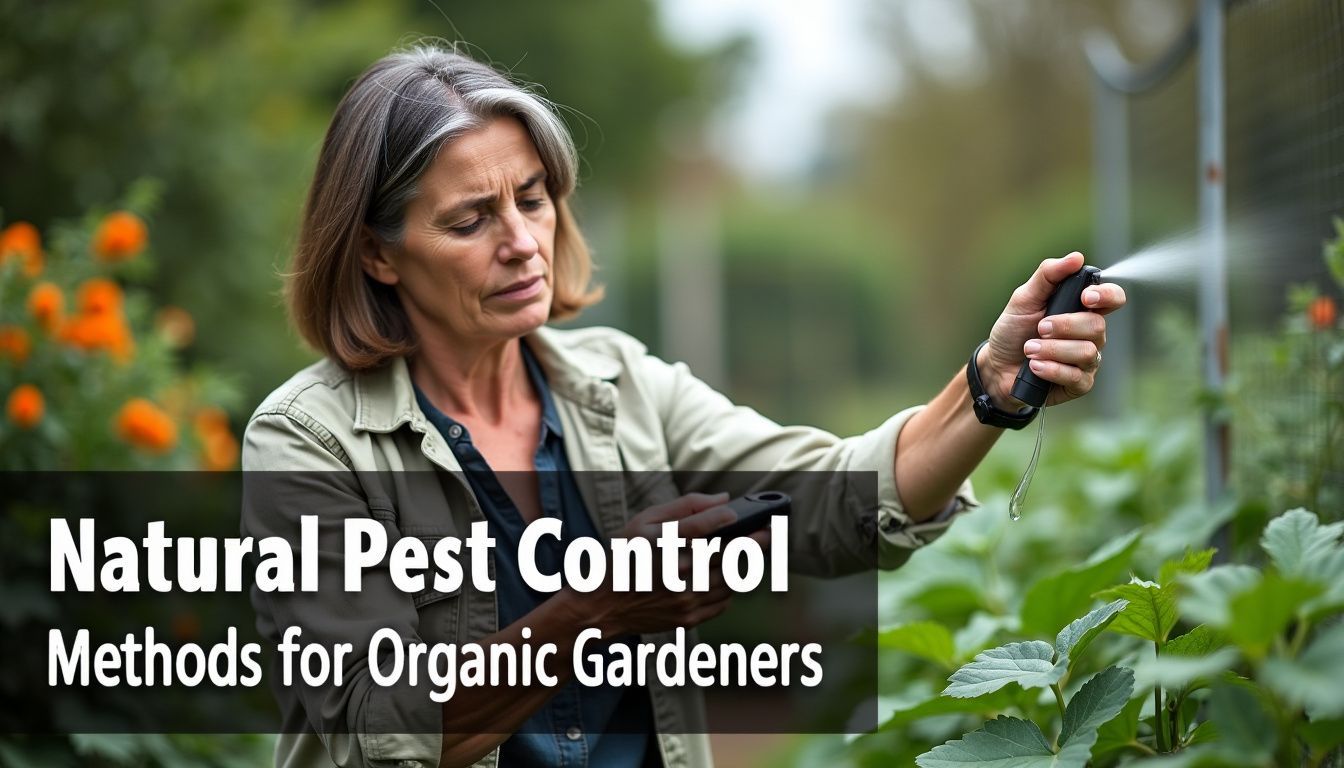Are you tired of pests in your garden without using harsh chemicals? You’re not alone. This article will guide you through natural methods to keep those pesky critters at bay, from beneficial bugs to DIY sprays.
Get ready for a greener garden!
Importance of Organic Pest Control

Organic pest control contributes significantly to preserving the equilibrium of our ecosystems. In contrast, pesticides disrupt this balance. Studies demonstrate that 90% of individuals carry pesticide byproducts in their systems due to consumption of supermarket produce.
This statistic alone emphasizes the extensive influence of man-made pest control techniques.
The Environmental Protection Agency (EPA) has acknowledged that fruits and vegetables often carry slight amounts of these damaging chemicals. Simultaneously, research from California has discovered solid links between pesticide exposure and health complications among farm workers and their families.
Equally concerning is the reduction in honeybee populations, with a loss of 33% of hives in 2017, primarily attributed to neonicotinoid pesticides. Shifting towards sustainable pest control not only preserves our well-being but also defends key pollinators like bees, which are fundamental for food production.
Building a Healthy Soil Ecosystem
Building a healthy soil ecosystem starts with understanding its importance for organic gardening. It usually takes about three years to fully develop this kind of environment. Why does it matter? Because good soil supports plant health and fights off diseases naturally.
Adding fresh compost around plants feeds the soil. Make sure your compost piles heat up to around 140°F. This high temperature kills unwanted diseases and weed seeds, keeping your garden safe and clean.
Organic amendments boost the foundation of your garden’s biome, making everything thrive from the ground up.
Beneficial Insects as Natural Defenders
Helpful insects serve as natural defenders in your garden. Attract ladybugs and birds to control pests effectively. Garden spiders and wasps also play significant roles. They hunt harmful insects and aid in maintaining balance.
For ideal results, use USDA Organic or OMRI certified products. These choices safeguard both your plants and the environment. The right combination of beneficial predators guarantees a flourishing garden ecosystem.
You can keep your plants healthy without harsh chemicals.
Hand-Picking Pests
Hand-picking pests offers a simple solution for garden lovers. Grab a jar filled with soapy water. Search your plants early in the morning or evening. These times make it easier to spot hiding insects.
Carefully remove the pests and drop them into the jar. This method helps reduce the pest population without harsh chemicals.
Monitor your plants daily for two weeks after treatment. Keep an eye out for any new arrivals. Staying vigilant will pay off. Hand-picking creates a healthier garden environment. You’ll also feel a sense of accomplishment as you protect your organic space.
Using Garden Mesh and Barriers
Garden mesh and barriers provide a strong line of defense against pests. Use garden mesh fabric or agfabric as a physical barrier. Apply this protective layer right after planting.
It guards your crops from insects and animals. For individual fruits, consider using see-through organza bags. These bags offer great protection while allowing sunlight through.
Keep your plants healthy by removing damaged leaves and excess fruit. Limit this removal to one-third of the plant. This simple act supports your garden’s success. Protective barriers not only shield plants but also enhance yields.
Invest in garden netting, fencing, or screening to better safeguard your harvest.
Neem Oil Applications
Neem oil serves as an excellent organic pest control option. It acts as a natural insect repellent that targets various garden pests. Applying neem oil treatments in the late afternoon or evening yields the best results.
Use a 1-gallon hand pump sprayer for even coverage. After heavy rain or overhead watering, reapply the oil to maintain its effectiveness. This eco-friendly solution works as a botanical insecticide, contributing to sustainable pest management in your organic garden.
Bacillus thuringiensis (B. T. )
Bacillus thuringiensis, or B.T., makes a valuable ally for organic gardeners. This natural insecticide targets only larvae-stage insects, leaving beneficial bugs unharmed. It works by releasing a toxin that disrupts the gut of these pests, effectively managing their population.
Using B.T. products that hold USDA Organic or OMRI certification guarantees safety for humans and animals. Many organic farmers regard B.T. as vital for effective pest control. It’s a dependable option for those pursuing ecofriendly insect control without harsh chemicals.
Diatomaceous Earth
Diatomaceous earth (DE) acts like nature’s armor against hard-shelled insects. This fine powder, made from fossilized algae, works wonders for organic pest control. When insects come in contact with DE, it scratches their exoskeletons, leading to dehydration and death.
It offers effective organic insect control without using toxic chemicals.
For best results, apply treatments in the late afternoon or evening. Using a 1-gallon hand pump sprayer helps distribute the powder evenly. This eco-friendly pest management tool provides safe insect repellent solutions for your garden.
Enjoy a natural approach to pest eradication while keeping your garden healthy and vibrant.
Spinosad Treatments
Spinosad is an effective organic pest control option. This natural insecticide targets many garden pests without harming beneficial insects. Mixing Spinosad with hard water reduces its effectiveness.
Use bottled water for the best results. Always select USDA Organic or OMRI certified products to guarantee safety. After rain or heavy watering, reapply the treatment to maintain its strength.
Spinosad treatments offer gardeners an eco-friendly way to manage pests efficiently.
Pyrethrin or Pyrethrum Sprays
Pyrethrin serves as an effective organic pesticide option. This natural ingredient comes from chrysanthemum flowers. It disrupts the nervous system of many garden pests. Apply Pyrethrin sprays in the late afternoon or evening.
The cooler temperatures help maximize effectiveness.
Use a 1-gallon hand pump sprayer for easy application. Reapply after rain or overhead watering. Many gardeners favor this plant-based spray for its eco-friendly nature. It acts as a safe insect repellent while being nontoxic to the environment.
Keep your garden healthy by harnessing this botanical pest control method.
Essential Oils for Pest Control
Essential oils like peppermint and rosemary can help keep pests at bay. These natural pest repellents work well in gardens. To apply them effectively, use a 1-gallon hand pump sprayer.
Spot treat specific areas where pests linger.
Timing matters too. Apply treatments in the late afternoon or evening. This approach helps avoid harming beneficial insects. Essential oils create a nontoxic environment. Embrace this botanical pest control method for a healthier garden.
Soap Solutions
Soap solutions can be a powerful ally for organic gardeners. Use diluted castile soap to make an effective homemade bug spray. This nontoxic insecticide targets many garden pests without harming beneficial insects.
Garlic barrier sprays can also enhance your pest control efforts. Apply treatments in the late afternoon or evening for the best results. Grab a 1-gallon hand pump sprayer for easy application.
Homemade plant sprays are eco-friendly and effective against unwanted bugs.
Planning Ahead for Pest Prevention
Planning ahead for pest prevention makes a big difference in an organic garden. Start by cleaning up plant debris and supports. Keeping things tidy helps stop pests from finding a home in your garden.
Compost piles need to reach about 140°F to kill off harmful pests and pathogens.
Attract beneficial insects like garden spiders, wasps, and ladybugs. These natural predators help keep pest numbers low. Monitor your plants daily for two weeks after treatments. This helps you catch any lingering pests before they multiply.
Keeping a close eye on your garden goes a long way in organic pest management.
Tips for Using Organic Pest Control
Using organic pest control can be fun and effective. Apply treatments in the late afternoon or evening for the best results. This timing helps avoid harming beneficial insects that are active during the day.
Spot treat specific areas to target pests directly. A 1-gallon hand pump sprayer makes it easy to manage your applications.
Reapply treatments after it rains or when you water the garden. Look for concentrated versions of products for better value. Organic methods offer nontoxic pest control options. They are safe for your garden and the environment.
With a little planning, you can create a thriving garden free of harmful chemicals. Enjoy your gardening while keeping pests at bay!






